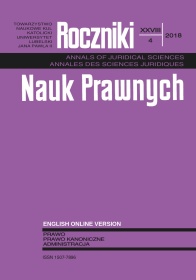The Worker’s Employment Contract—the Legal Regulations of Interwar Poland
The Worker’s Employment Contract—the Legal Regulations of Interwar Poland
Author(s): Sebastian KwiecieńSubject(s): Law, Constitution, Jurisprudence, History of Law
Published by: Towarzystwo Naukowe KUL & Katolicki Uniwersytet Lubelski Jana Pawła II
Keywords: employment agreement; workers’ employment agreement; wage protection; work regulations; termination of employment relationship
Summary/Abstract: In independent Poland, the foundations for a new area of law, that is, labour law were laid, abandoning the previously crucial principle of freedom of contract underlying the contractual relationship between an employee and the employer. On March 16, 1928, the President of the Republic of Poland issued an ordinance on labour contracts, defining mutual obligations of employees and their employers under an employment contract based on which the employee undertook to perform work for the employer against remuneration. The legislator permitted the conclusion of employment contracts in writing, orally or in any other customary form accepted in a given workplace. In exchange for the work performed, the employer was obliged to pay appropriate contractual remuneration, as specified in the employment agreement.Importantly, this ordinance contained a number of protective regulations that were designed to protect the worker and make his position towards the employer more equal. They included regulations concerning remuneration protection or the employer’s obligation to specify work rules. Most importantly, however, the ordinance protected the worker from immediate and unjustified dismissal.
Journal: Roczniki Nauk Prawnych
- Issue Year: 28/2018
- Issue No: 4EV
- Page Range: 73-97
- Page Count: 25
- Language: English

